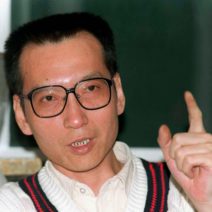The missing Nobel laureate
Comments Off on The missing Nobel laureateOn December 9, the Los Angeles Times published an op-ed piece by CHRD International Director Renee Xia. The full text follows, or it can be viewed on the Times’ website at http://articles.latimes.com/2010/dec/09/opinion/la-oe-xia-nobelist-20101209
Neither China’s Liu Xiaobo nor his wife or family or friends will be in Oslo to receive his Peace Prize. Who will speak up for him?
This year’s recipient, Liu Xiaobo, the Chinese writer and dissident currently serving 11 years in prison for supporting the pro-democracy and human rights manifesto Charter 08, will not be here to receive the honor. Nor will his wife or any other relatives or close friends, as they have been placed under house arrest or police surveillance, or barred from traveling abroad.
The empty chair will speak volumes about the deteriorating human rights conditions in China, a rising economic and political power unchecked by democratic balances. It will also speak of the tremendous sacrifices that Chinese human rights and pro-democracy activists have made, and the urgent need to support their struggle for justice and human rights for those living in China, and for upholding universal values.
Since the Nobel was announced Oct. 8, police across China have been intimidating and penalizing anyone who tries to celebrate or spread the good news. Liu’s wife, Liu Xia, was last heard from on Twitter on Oct. 18. Authorities warned Liu Xiaobo’s father and brothers to stay silent. Several of Liu’s friends and associates in Beijing are guarded around the clock by police. Border control authorities barred his lawyer, Mo Shaoping, and outspoken Beijing University professor He Weifang from traveling to London for a seminar, for fear they would go to Oslo. Dozens of other friends or supporters of Liu, including the economist Mao Yushi and the artist Ai Weiwei, also have been stopped from leaving the country for conferences. At least 100 activists have been visited by police and threatened with severe consequences for speaking to the media about the prize. Several supporters of Liu and signatories of Charter 08 have been detained or sent to “re-education through labor” camps on trumped-up charges.
This campaign of intimidation and retaliation makes it evident that the Nobel Committee made a wise and courageous decision to award the Peace Prize to Liu, one of thousands of prisoners of conscience in China.
Chinese leaders have outdone Myanmar’s military junta and even Hitler’s Nazi Germany in their efforts to snub the Nobel Peace Prize and retaliate against the recipient. When Burmese democratic opposition leader Aung San Suu Kyi won the Peace Prize in 1991 while she was under house arrest, her son made the acceptance speech at the ceremony. When Carl von Ossietzky, the German pacifist journalist, won in 1935 while imprisoned in a concentration camp, Nazi Germany declared that Ossietzky was free to go to Norway to accept the prize, while refusing him a passport. The Chinese government is handing out a competing Confucius Peace Prize.
Over the last decade, the Chinese government has invested heavily in soft diplomacy and image beautification projects, such as the 2008 Beijing Olympics and this year’s Shanghai Expo. But international opinion will not look kindly on a government that jails its first Nobel Peace Prize winner. Keeping Liu in prison provides a platform for international mobilization to end rights abuses in China, and will continue to shame the government for its failures to honor its international treaty obligations to respect human rights.
Beijing puts out the Confucius prize to boost its claims that rights and freedoms are Western ideas, and that “stability” and prosperity are more desirable to the Chinese people. On the world stage, China appears as a confident and powerful player. Yet at home, the government is nervous about losing control, terrified that the people will find their own voice. Liu Xiaobo has articulated their voice. By silencing him, the government is silencing the voice of conscience. It is not the silenced Chinese people but the government that rejects the universal values of human rights and democracy.
President Obama, the recipient of last year’s Nobel Peace Prize, has a special responsibility to advocate for the freedom of fellow laureate Liu. Obama should attend the Nobel ceremony and take the opportunity to speak publicly about China’s worsening human rights conditions. He should ask Chinese President Hu Jintao to free Liu, release his wife from house arrest and allow them to travel to Oslo. Indeed, Obama has a solemn responsibility to speak for the Chinese citizens who cannot, to give substance to the words in his acceptance speech in Oslo a year ago: “Peace is unstable where citizens are denied the right to speak freely or worship as they please, choose their own leaders or assemble without fear.”
Despite Beijing’s information blackout on the prize ceremony, many of China’s 420 million netizens will find ways to watch the ceremony and spread the word online. Chinese authorities may have succeeded in keeping Liu, his wife and invited guests from China away from the Nobel ceremony. But they cannot prevent the ideas and values that Liu has spent his life promoting from traveling across national borders and China’s great Internet firewall.
Renee Xia is international director of the Network of Chinese Human Rights Defenders, which documents human rights abuses in China.

